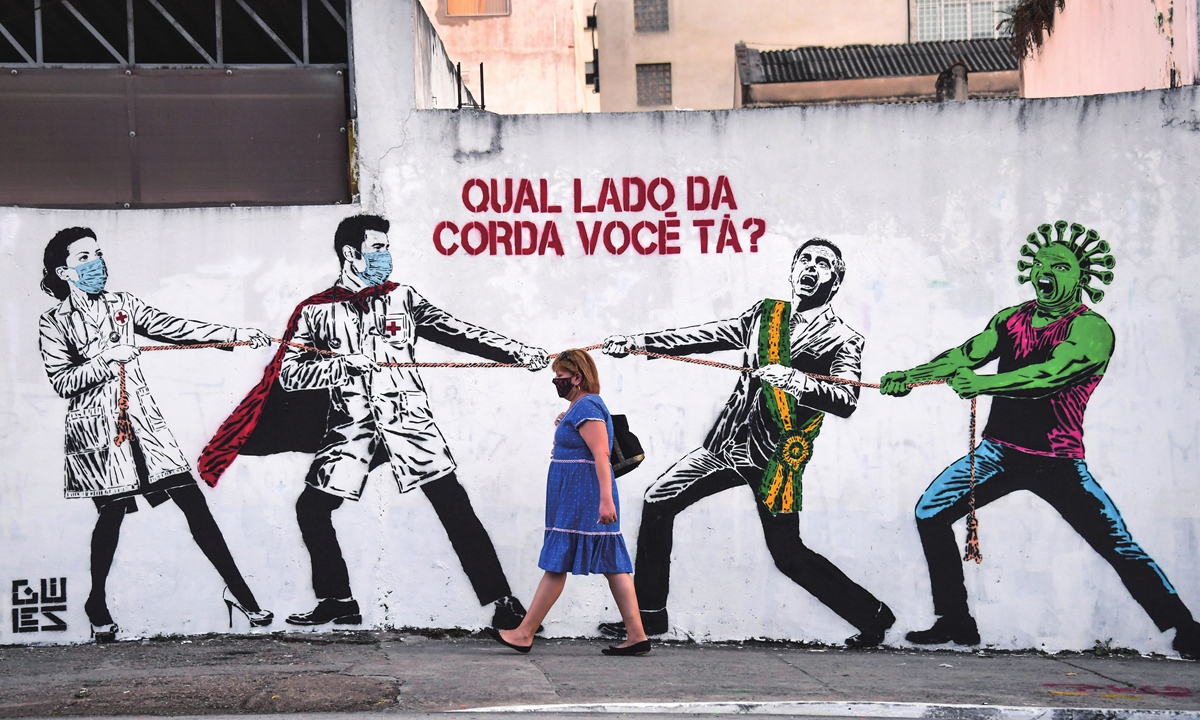Brazil-based Chinese merchants assist locals despite own epidemic loss
By Li Qiao Source:Globaltimes.cn Published: 2020/6/19 3:40:53

A woman walks by a wall with graffiti depicting Brazilian President Jair Bolsonaro and a figure representing COVID-19 in a tug of war against health workers with a phrase that reads in Portuguese "Which side of the rope are you on?" Photo: AFP
Global COVID-19 cases reached 10 million on Sunday afternoon, according to data from the Johns Hopkins University.
Brazil is second only to the US in terms of COVID-19 infections, but the government has focused on keeping its economy going instead of preventing the virus' spread. This approach and the Brazilian government's apparent casual attitude have triggered social concerns, especially among Chinese living in Brazil who are aware of the dangers of the disease. Despite their anxiety, Chinese communities in Brazil have been participating in virus mitigation and have great expectations for China-Brazil cooperation in vaccine development.
More than 1.3 million confirmed cases have been reported in Brazil as of press time, with 57,070 deaths.
Brazilian President Jair Bolsonaro's skeptical attitude toward anti-epidemic measures, the government's inadequate mobilization capacity, and a collapse of its medical system are causing Brazilians to worry about their safety. Media reports showed Brazilians, in the capital Brasilia and Sao Paulo, protesting their president's failure in fighting the virus
More than 300,000 Chinese people live in Brazil. Many of them own small businesses. The Chinese community has donated money and medical resources to help epidemic mitigation.
China and Brazil are working on a plan that would allow Brazil to produce a vaccine on a large scale and immunize millions of Brazilians, according to media reports.
The Chinese embassy in Brazil and Chinese companies have also shared anti-epidemic experience and donated medical resources to Brazil.
In early June, Bolsonaro threatened to quit the World Health Organization and stop reporting Brazil's COVID-19 data. A Brazilian Supreme Court decision ordered Bolsonaro's administration to resume publishing complete COVID-19 statistics after moves to suppress the information prompted accusations of authoritarian efforts to cover up the crisis, The Guardian reported.
Many Chinese in Brazil remain worried the local epidemic may worsen.
Chinese in Brazil reached by the Global Times said they have become numb to the rapid growing number of infections. "Global cases reaching 10 million is an inevitable result of the failed anti-epidemic leadership in the United States, of which Brazil is a staunch follower," Cheng Pu, chairman of the Brazil-China Cultural Communication Association, told the Global Times on Monday.
Cheng, with many Chinese in Brazil, is still worried and anxious with the intensifying epidemic. He hopes that the leaders of these countries will put aside political goals and unite together with the world to fight the COVID-19 pandemic for the sake of people's lives.
Standing together
"I'm anxious as I have no income because of the closure of businesses due to the epidemic. However, easing quarantine measures makes me worried about the worsening of the epidemic," Chen Shikai, a 33-year-old Chinese man who has been living in Brazil for seven years, told the Global Times.
Chen, from East China's Zhejiang Province, runs a small commodity wholesale store selling travel souvenirs, false eyelashes and acrylic nail tips in Rio de Janeiro.
He has been losing 10,000 ($1,912) to 20,000 BRL a month since his store was closed three months ago. He still has to pay 15,000 BRL in monthly rent.
The costs of living of his 20 Brazilian and two Chinese employees are also a heavy burden on Chen.

Chinese in Rio de Janeiro donate basic food baskets to Brazilians living in poverty in May. Photo: Courtesy of Cheng Pu
"The Brazilian government has provided salary subsidies for employees for April and May, but the pressure will remain on the employers' shoulders because businesses won't recover soon," Chen said.
Chen has no plans to fire any employee and intends to get through the difficulties with the Brazilians. "What if they have no other way to live but to steal and rob? It could greatly affect public order," Chen said.
He appreciates the care and assistance he received from locals during his years of doing business in Brazil. "I have been living here for seven years and have become friends with Brazilians," he said.
Many retailers who sell fridge magnets and key chains on Monte Cristo replenished their stocks with Chen. Chen also expressed concern about his clients.
The souvenir sellers are mostly from low income backgrounds. Chen worries that government subsidies are only enough to buy food. "How will a seller be able to purchase souvenirs to restart their small businesses after Brazil fully reopens the economy," he asked.
The Brazilian president appealed for reopening the economy regardless of the severity of the local epidemic but was criticized by many Brazilians who fear that would worsen the epidemic, Chen said.
Chen is also waiting for an upcoming government order and is preparing to reopen his store. Online orders and logistics delivery will be his preference to reduce contact with clients. Employees will be equipped with masks, face guards and protective outfits. Chen has bought around 10,000 masks for his employees.
"Brazilians love beauty and there should be a lot of people who want to get eyelash extensions and manicures after quarantine," predicts Chen who said he believes his nail tips and false eyelash business should be able to recover.
But the pandemic has also hit the global tourism sector. In the short term no one will travel, so the souvenir business will be a money loser, he said.
Helping out
Just like Chinese residents in Brazil, the Chinese government and companies have also made efforts to help Brazil fight the pandemic, sharing anti-epidemic experience and donating medical resources including protective outfits and ventilators.
The Chinese Embassy in Brazil held an online seminar on Tuesday on how to promote international cooperation in the fight against COVID-19, as well as exchanged experience on the use of traditional Chinese medicine in the fight against the epidemic, the Xinhua News Agency reported.

Dancers wearing face masks perform for a live streaming replacing the traditional Boi-Bumba folklore festival, canceled amid the pandemic, in Parintins, Amazonas state, Brazil, on Saturday. Photo: AFP
Brazilian scholar Ronnie Linse, director of The Center for China & Brazil, said China has provided great assistance to Brazil and supported its fight against the epidemic, which demonstrates the sincere friendship between the two peoples, China News Service reported.
The Brazil-China Cultural Communication Association has also been working with local NGOs and has donated baskets of food including rice, beans, sugar and cooking oil to the poor.
Each basket costs 52 BRL and Chen has donated 50 baskets. Chen is a member of the association.
Cheng Pu, chairman of the Brazil-China Cultural Communication Association, told the Global Times that Chinese members of the association have donated a million masks and other protective products to local governments, medical institutions and police, and provided about 8,000 basic food baskets to Brazilians living in poverty.
Some are also worried that the Brazilian health system cannot handle more patients.
The health care system in Sao Paulo is close to collapsing, with 87 percent of intensive care beds in the city and 97.5 percent in the suburbs already occupied, according to Sao Paulo Mayor Bruno Covas, CCTV reported.
Brazil will join China's efforts to strengthen global cooperation in COVID-19 vaccine trials, as the Butantan Institute in Brazil plans to cooperate in Phase III clinical trials for a COVID-19 vaccine candidate developed by a Chinese company.
Cheng Pu said he was excited to learn that China and Brazil will cooperate in vaccine development. "It is conducive to the health of humankind."
RELATED ARTICLES: